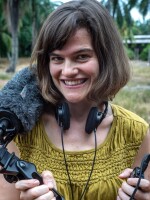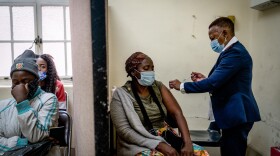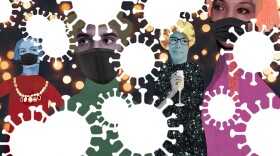
Michaeleen Doucleff
Michaeleen Doucleff, PhD, is a correspondent for NPR's Science Desk. For nearly a decade, she has been reporting for the radio and the web for NPR's global health outlet, Goats and Soda. Doucleff focuses on disease outbreaks, cross-cultural parenting, and women and children's health.
In 2014, Doucleff was part of the team that earned a George Foster Peabody award for its coverage of the Ebola outbreak in West Africa. For the series, Doucleff reported on how the epidemic ravaged maternal health and how the virus spreads through the air. In 2019, Doucleff and Senior Producer Jane Greenhalgh produced a story about how Inuit parents teach children to control their anger. That story was the most popular one on NPR.org for the year; altogether readers have spent more than 16 years worth of time reading it.
In 2021, Doucleff published a book, called Hunt, Gather, Parent, stemming from her reporting at NPR. That book became a New York Times bestseller.
Before coming to NPR in 2012, Doucleff was an editor at the journal Cell, where she wrote about the science behind pop culture. Doucleff has a bachelor degree in biology from Caltech, a doctorate in physical chemistry from the University of Berkeley, California, and a master's degree in viticulture and enology from the University of California, Davis.
-
Early fears of an escalating outbreak have not come to pass. Scientists are finding that the virus needs a very particular set of circumstances to spread effectively.
-
A new study suggests that. yes, there are superdodgers. But explaining why they've been able to avoid the virus is a bit complicated.
-
Although monkeypox's recent spread has caused concern, its similarities to smallpox have given the public health world a head start on combating it.
-
Scientists are beginning to come up with answers to the question of how long antibodies from an infection can protect you — and what they'll protect you from.
-
It's a sibling of the first omicron variant that swept the world. Is it more contagious? Does it cause severe disease? Will it keep current omicron surges going? Researchers are looking for answers.
-
Data from 78,000 South Africans with COVID show the Pfizer vaccine is far less effective in preventing infection by the omicron variant. But there is still significant protection from severe illness.
-
In small studies in South Africa and in Germany, the results indicate a marked decrease in the ability of vaccines to neutralize this variant. But there are other findings that are encouraging.
-
You might want to cancel that holiday party, and definitely dust off your face mask. Don't panic, but do step up your precautions. Here's how.
-
The World Health Organization deemed it a variant of concern, and the U.S. is banning travel from parts of Africa where it's spreading. Here's what scientists know and what they're trying to learn.
-
Boosters are available for higher-risk people who got the Pfizer vaccine. But what about people who got the one-shot Johnson & Johnson? Some doctors say they need an extra shot even more urgently.










